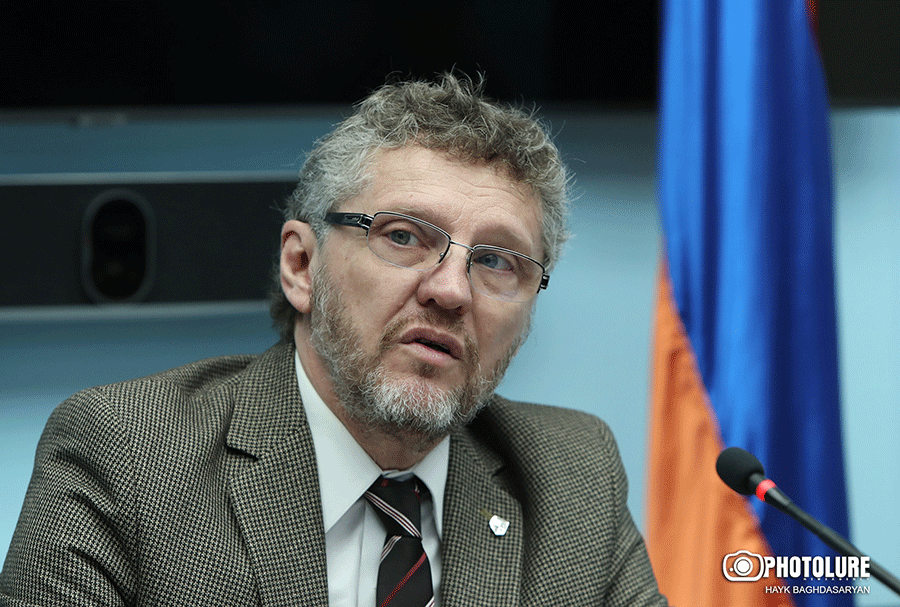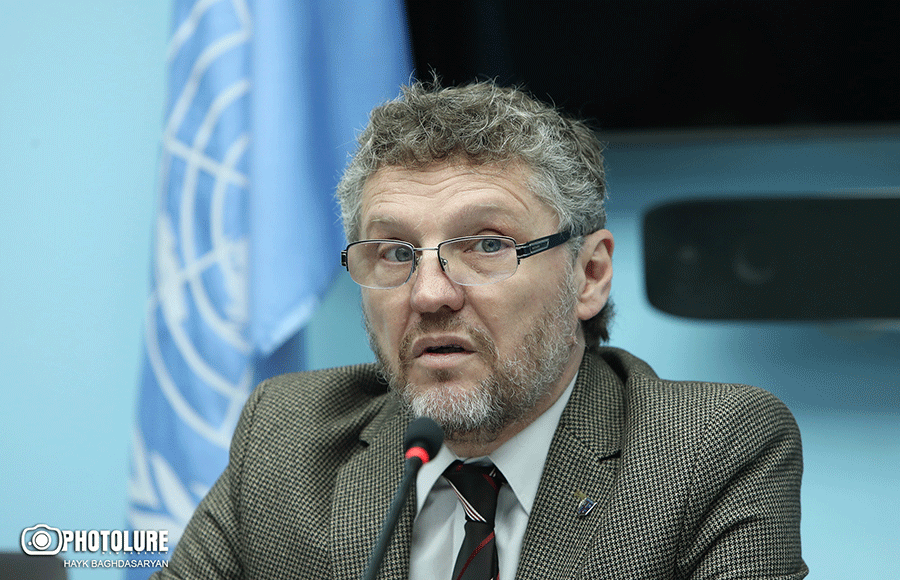A UN human rights expert today urged Armenia to establish comprehensive transitional justice mechanisms to address human rights violations committed in the context of Soviet rule, autocratic governments, and the conflict in Nagorno-Karabakh.
Fabian Salvioli, the UN Special Rapporteur on the promotion of truth, justice, reparation and guarantees of non-recurrence, said that since Armenia’s independence from Soviet rule in 1991, authorities have adopted a series of measures to address the legacy of those violations.
“Although these measures have not been embedded in a transitional justice process, or officially considered part of such an agenda, many have been directed at reverting the heirloom of repressive or autocratic regimes towards democratic consolidation, or at investigating and providing redress for violations suffered by Armenian soldiers or civil society in the conflict,” Salvioli said in a statement at the end of a nine-day visit to the country.
Read also
“However, progress in truth-seeking, criminal justice, reparation and memorialisation of past human rights violations has been inconsistent,” he said.
Salvioli, called on Armenian authorities to establish an independent mechanism to investigate and record those violations, and make them accessible to current and future generations, He also called on the prosecutorial and judicial authorities to urgently step-up efforts on accountability for those violations.
He praised efforts to provide reparations to victims of Soviet repression, soldiers dead or incapacitated during the conflict, civilian victims of the conflict, and victims of the 1 March 2008 events, but noted that other victims of human rights violations have struggled to receive reparations.
“I urge the Government to adopt necessary legislative and administrative measures to ensure that victims of illegal expropriations, state repression and abuse in the context of manifestations, and torture and suspicious deaths in law-enforcement or armed forces are given specific legal status as victims of human rights violations and full reparation accordingly,” Salvioli said.
While acknowledging that the country has made strides in establishing democratic institutions since the 1990s, the UN expert said the progress had not been linear and pointed to “enormous challenges.”
He highlighted electoral fraud, insufficient independence of the judiciary, widespread corruption in state institutions, and repressive activity by security and armed forces.
“The government must give an unequivocal sign to society of its commitment towards a holistic transitional justice process aimed at addressing past abuses, preventing their recurrence, and consolidating the rule of law,” Salvioli said.
The expert said the latest stages of conflict in Nagorno-Karabakh in 2020 and 2023 had created enormous challenges. “My arrival in Armenia has coincided with the forced displacement of 110,000 Armenians from Nagorno-Karabakh as a result of the conflict. I have met with refugees and authorities in receiving communities and in Yerevan, where I observed the pain and urgent needs of the displaced population and immense efforts by the authorities to address their basic and urgent needs,” he said. “I extend my solidarity to the refugees, and commend authorities for assisting these victims,” he said.
During his visit, Salvioli met government officials, civil society representatives, refugees and families of victims, and representatives of the international community. He also visited memorials, refugee camps and conflict sites.
The Special Rapporteur will submit a full report on the visit to the Human Rights Council in 2024.
Mr. Fabian Salvioli (Argentina) was appointed by the UN Human Rights Council in 2018 as the Special Rapporteur on the promotion of truth, justice, reparation and guarantees of non-recurrence. He is a human rights lawyer and professor. Fabián Salvioli is professor of International Law and Human Rights at the School of Law of the University of La Plata. He has lectured in many countries and universities across the Americas, Europe, Africa and Asia. Mr. Salvioli has authored several books and articles on international human rights law. He was member of the United Nations Human Rights Committee between 2009 and 2016, and its President between 2015 and 2016.
Special Rapporteurs are part of what is known as the Special Procedures of the Human Rights Council. Special Procedures, the largest body of independent experts in the UN Human Rights system, is the general name of the Council’s independent fact-finding and monitoring mechanisms that address either specific country situations or thematic issues in all parts of the world. Special Procedures experts work on a voluntary basis; they are not UN staff and do not receive a salary for their work. They are independent from any government or organization and serve in their individual capacity
























































